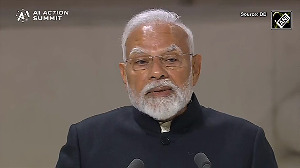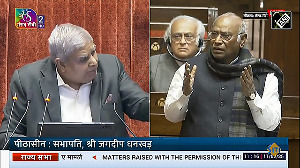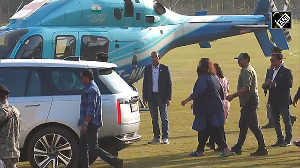All Russian schools re-open on September 1 after the summer vacation. On that day, parents accompany their children to school. The children carry flowers and other gifts for their teachers.
In view of the terrorist strikes by Chechen terrorists in Moscow since August 24, the Russian authorities had issued a general alert and ordered special protection for sensitive establishments, including for schools in the Caucasus area. An armed guard of four police officers had been posted at the Beslan school.
Shortly after the children and their parents entered the school, a group of 25 to 30 terrorists reached the school gate in a stolen police van.
As the police guards at the gate tried to check their identity, the terrorists opened fire, killing two of them and injuring the other two. They also killed six parents who rushed to the assistance of the police guards.
They then entered the school building and took everyone inside as hostages. There were over 1,000 people inside, including the children, their parents and teachers. They forced the children into one hall and the parents and teachers into another. They placed some of the children near the windows in order to discourage any attempt by the security forces to raid the building to free the hostages.
As the security forces, including special commandos, took up position outside the building, the terrorists announced two demands, which they wanted to be complied with before they would release the children.
'Black Widows' behind Beslan tragedy
These were: Suspension of all counter-terrorism and counter-insurgency operations in Chechnya and Ingushetia, and the withdrawal of all federal security forces from there. They also warned that they would kill 50 non-Muslim children for every jihadi terrorist killed by the security forces and 20 non-Muslim children for every terrorist injured.
The Russian authorities then persuaded the Mufti of the local Muslim community to act as a mediator and persuade the terrorists to release the children. The terrorists refused to negotiate with him or with any other member of the local Muslim community, saying they would negotiate only with the local officials or with representatives of the local non-Muslim community. After some time, they insisted they would negotiate only with Alexander Dzasokhov, the North Ossetian President, or Murat Zyazikov, the President of Ingushetia or Leonid Roshal, a Russian doctor who had played the role of a hostage negotiator with Chechen terrorists earlier. The security authorities agreed and brought these three persons to the school.
Deliver Chechen leaders, take $10mn
The jihadi terrorists rejected the requests of the authorities and the intermediaries to let them send food, water and medical assistance for the hostages, particularly for the children. They warned the hostages not to use the toilet.
Some of the parents and teachers managed to spread word amongst the students that in order to protect themselves against dehydration, they should eat the flowers which they had brought for their teachers. As the jihadi terrorists noticed the children doing so, they snatched the flowers from them and threw them away.
Many children collapsed and died of dehydration. Others managed to remain alive by drinking their own urine when the jihadi terrorists were not watching them.
'Russia school seizure was bid to start war'
As the negotiations stretched on for two days, few children kept escaping from the school. As they did so, the jihadi terrorists used to fire in the air from the windows in order to scare the other children and prevent them from trying to escape.
On September 3, a large group of children managed to escape from the custody of the jihadi terrorists. As they did so, the terrorists started firing at them, killing or injuring some who fell on the ground.
On seeing this, some of the Russian special commandos rushed towards the fleeing children and took them to safety. Other commandos gave them covering fire by firing on the terrorists, who had taken up position near the windows.
Apparently fearing an attempt by the commandos to enter the building, the terrorists started throwing hand-grenades not only at the commandos, but also at the hostages inside the building, in order to prevent any attempt at a mass escape. They also set off some of the explosive devices, which they had with them. The explosions caused the collapse of the roof of one of the halls.
The commandos then stormed the buildings, killed or captured the terrorists and rescued the surviving hostages. About 350 innocent civilians and members of the security forces were killed, a half of them children.
Raman: Russia braces for more attacks
While some children died of dehydration, many others died of sheer fright or unattended injuries sustained by them.
Among the suspected ring leaders of the terrorists, who were present on the spot, were: Magomed Yeyloyev, also known as Magas, the leader of an Ingush terrorist organisation, whose name is not known. Doku Umarov, a Chechen warlord. A man who called himself Gorets, meaning man from the mountains, who conducted the negotiations with the three intermediaries.
It is not known whether these three persons managed to escape or were killed by the commandos.
Swapan Dasgupta: Beslan is a wake-up call
The series of terrorist strikes in Russia since August 24 have been as traumatic an experience for the Russians as the 9/11 terrorist strikes were for the Americans. But the following observations can be made:
Lack of panic: Unlike in the US where the terrorist strikes led to considerable panic, there was a remarkable absence of panic in Russia. There were no cancellations of air, train or metro travel, the restaurants continued to do brisk business and the people went about their daily routine normally.
Courage of the emergency services staff: Just as in the US on and post 9/11,
Lack of intelligence: Just as in the US, in Russia too, while there was considerable general intelligence regarding the possibility of terrorist strikes around this period, no specific intelligence as to how, when and where the terrorist strikes would come was available. The security agencies were unaware of the fact that the terrorists, posing as construction workers, were clandestinely storing arms and ammunition, hand-grenades and explosives in the school premises.
Weak physical security: In the US, physical security was weak before 9/11, but has been considerably tightened up since. In Russia, it continues to be weak despite repeated spectacular terrorist strikes. Weak physical security is largely to be blamed for the success of the jihadi terrorists in smuggling the explosive devices into the two planes.
Lack of sharing of intelligence with the public: In the US, since the Pan Am Lockerbie crash of 1988, intelligence agencies share with the public intelligence indicating a serious threat to the public so that the people could be more careful and assist the security forces. In Russia, the Soviet era practice of keeping the public in the dark about the likely serious threats to their security persists.
It has been alleged by many that the authorities knew from the first moments of the two air crashes on August 24, that they had been brought down by explosive devices planted by the terrorists, but they avoided admitting this for nearly three days.
Similarly, the fact that some of the trained Chechen suicide bombers were still at large in Moscow and could indulge in more serious acts of terrorism were not divulged to the public till after the Metro entrance explosion of August 31.
The public was not alerted to the possibility of a terrorist strike on the school re-opening day. The Russian security authorities avoid sharing information with the public on the ground that too much of sharing could create unnecessary panic and encourage copy-cat terrorism.
Lack of transparency, accountability and open post-mortem into national security failures: In the US, every instance of a major national security failure is followed by innumerable open enquiries by the concerned Congressional committees as well as enquiry commissions appointed by the executive.
Thanks to such enquiries after 9/11, not only the US public, but also the international community knows what went wrong, where and how, who was responsible, what action was taken against him or her, what deficiencies were there, how to correct them, what reforms in the national security management machinery are required etc.
In Russia, while in-house enquiries might have been held into past security disasters, the public has not been taken into total confidence about their results and the corrective follow-up action taken. In the absence of information and knowledge, there is hardly any meaningful public debate on internal security management.
Unlike in the US, where non-governmental experts play an active role in such matters, in Russia the role of the non-governmental experts continues to be limited.
Absence of a fusion of the counter-terrorism and counter-terrorist approaches: There is an overemphasis on the counter-terrorist approach, which believes that if one goes on eliminating the terrorist leaders and their foot soldiers one after the other, the problem will disappear. There is not adequate emphasis on the need for a simultaneous counter-terrorism approach, which treats terrorism as a phenomenon with many dimensions such as the political, economic, social etc and deals with it comprehensively.
In the Russian population as a whole, there is a belief that Russia would have been able to deal with the brutal terrorism of the Chechen and other jihadi groups but for what is perceived as the double standards followed by the US and other Western countries, which, even while condemning the brutality of the jihadi terrorists rationalise their bestial acts by talking of the causes for their anger and irrationality which, in their view, need to be addressed.
It is pointed out that while the acts of retaliation of the US and other Western agencies against the jihadi terrorists are projected as legitimate acts of self-defence, retaliatory action taken by the Russian security forces are sought to be projected as acts of vengeance or retribution and allegations of human rights violations are made against Moscow.
Even well-informed Russians, not known for any prejudice against the West, suspect that the US and other Western powers do not want Russia to emerge as a strong power. They believe the West would prefer that Russia remains in a state of weakness and instability and, for this purpose, they do not view the terrorism directed against Russia and its people with the same eyes as they view the terrorism directed against them.
They view Pakistan as the root source of all jihadi terrorism and accuse it of not taking any action against the Chechen and Uzbek terrorists operating from Pakistani territory. They point out that the focus of Pakistan's counter-terrorism operations is totally directed at terrorists posing a threat to US nationals and interests. Islamabad does not share intelligence relating to the activities of the Chechen and Uzbek terrorists from its territory with Russia and Uzbekistan. Nor are they informed about the arrests Pakistan has made of Chechen and Uzbek terrorists. Instead of handing them to over their agencies for interrogation and trial, they are kept in detention for a few weeks and then quietly released.
But whenever terrorists posing a threat to the US are arrested, the US is immediately informed and the terrorists are handed over to the US agencies.
Putin makes surprise visit to Beslan
Despite increasing criticism of President Vladimir Putin's counter-terrorism policy from sections of the media and academic circles who advocate a more flexible approach -- which does not rule out a political dialogue with indigenous terrorist organisations -- the population as a whole continues to support Putin's hardline approach. Their criticism is not of his hardline, but of the ineffectiveness of it. They want a hardline, which is effective and produces results.
There is a sudden interest in and admiration for the manner in which Prime Minister Ariel Sharon of Israel has effectively implemented a hit-with-no-holds-barred counter-terrorism policy against the jihadi terrorists. Immediately after the Beslan incident, Putin was reported to have telephoned Sharon and sought Israeli advice and expertise in dealing with the jihadi terrorists.
It is too early to say what changes Putin would introduce in his counter-terrorism policy post-Beslan. Will it be remain as tough, or become more nuanced?






 © 2025
© 2025